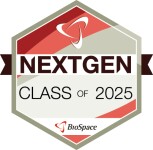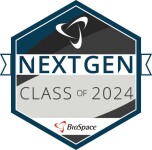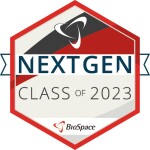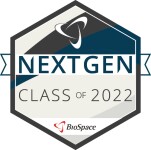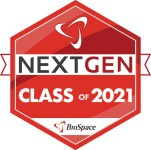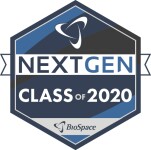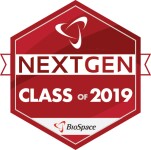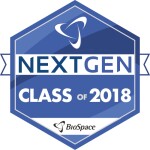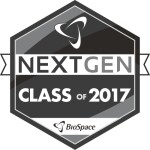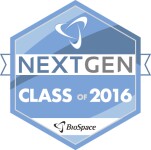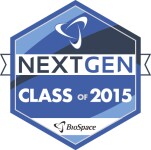
NextGen: Class of 2026
The top life sciences startups to watch this year
BioSpace is proud to present its NextGen: Class of 2026, a list of the hottest new life sciences companies in the United States.
To come up with this list, BioSpace identified companies that announced initial, seed or series A rounds between October 1, 2024, and September 30, 2025. They were then assessed using several different criteria including finance, partnerships, pipeline, growth potential and innovation until the BioSpace editorial team came up with its top 15 picks.
The impressive group of startups that make up BioSpace’s NextGen: Class of 2026 is already making an impact on the industry. Cell and gene therapies, radiopharmaceuticals and ADCs are among the products being developed by BioSpace’s 15 biotech startups to watch this year. We will continue to keep a close eye on these companies as we move into the new year.
Arnatar Therapeutics
Launched: August 2025
Headquarters: San Diego
Fundraising: $52 million series A
Notable: Arnatar Therapeutics’ DARGER platform is discovering medicines that combine siRNA with antisense oligonucleotides for cardiometabolic, liver, central nervous system and kidney diseases.
Differentiator: A biotech going after a disease we’ve never heard of is a green flag for BioSpace’s editors. Arnatar’s pipeline is full of these bets, with its approach bolstered by orphan drug and rare pediatric disease designations from the FDA.
ART104 has earned both. The antisense oligonucleotide therapy is being developed for Alagille syndrome (ALGS), a rare genetic disorder that causes bile to build up in the liver, damaging the organ.
One More Thing: The first patient in an early-stage trial of ART104 was dosed in September. If the treatment makes it all the way to market, patients with ALGS would finally have a disease-modifying treatment.
More on Arnatar Therapeutics
Bambusa Therapeutics
Launched: May 2024
Headquarters: Boston
Fundraising: $15 million seed, $90 million series A and undisclosed A-2
Notable: While serving as head of global external innovations at BioNTech, Bambusa Therapeutics CEO Shanshan Xu discovered Biotheus, which at the time was developing the breast cancer medicine now known as pumitamig. In a $11.1 billion deal, BioNTech bought in, while the remaining assets from Biotheus formed Bambusa.
Differentiator: Bambusa is targeting broad types of inflammation to build therapies that can tackle multiple diseases. The lead program is BBT001, which seeks to break patients out of the “itch-scratch cycle” that keeps them uncomfortable.
Bambusa dosed initial patients in a Phase 1 trial for atopic dermatitis in 2025. Early healthy volunteer data confirmed a favorable safety and tolerability profile.
One More Thing: Bambusa’s name is inspired by bamboo—a quick-growing and resilient plant that reflects the biotech’s goal to rapidly develop breakthrough therapies.
More on Bambusa
Corsera Health
Launched: September 2025
Headquarters: Boston
Fundraising: $50 million to date
Notable: Corsera Health was born out of a collaboration between former Alnylam CEO John Maraganore teamed up and Metsera founder Clive Meanwell, who was also involved in forming The Medicines Company, a cardiovascular-focused biotech that was ultimately bought by Novartis for $9.7 billion in 2020. The two men will serve as co-CEOs in this new venture.
Differentiator: Corsera is combining an AI-enabled predictive tool to estimate cardiovascular risk with an RNAi clinical program. The goal is to identify cardiovascular risk before it becomes a problem.
The lead program is a dual-targeting medicine going after the PCSK9 and angiotensinogen proteins. The first piece of that puzzle is COR-1004, a novel siRNA targeting PCSK9 that aims to reduce levels of low-density lipoprotein cholesterol (LDL-C) in the blood. Corsera filed a clinical trial application for the preventative program in October, with testing to be conducted in New Zealand.
Corsera plans to follow that up with an application for COR-2003 this year, which would target both PCSK9 and angiotensinogen.
One More Thing: Corsera’s medicines are meant to be taken once a year as a preventative.
More on Corsera
Haya Therapeutics
Launched: May 2021
Headquarters: Lausanne, Switzerland and San Diego
Fundraising: 18 million CHF ($19.7 million) seed, $65 million series A
Notable: Eli Lilly sees something exciting in Haya Therapeutics’ RNA-guided regulatory genome-targeting therapies. The Big Pharma signed a deal worth up to $1 billion with Haya in September 2024, a few months after the biotech announced it had raise $65 million in a series A round.
Differentiator: Haya is skipping proteins and looking to the dark genome to find new medicines for complex diseases. The biotech’s platform uses long-noncoding RNAs in a new approach to precision medicine that aims to address diseases at their roots.
The deal with Lilly revolves around finding new therapies for metabolic conditions such as obesity. But first up in Haya’s pipeline is the Wisper/HTX-001, an antisense oligonucleotide for nonobstructive hypertrophy cardiomyopathy. The company is working on investigational new drug-enabling studies now.
One More Thing: Given their earlier collaboration, Haya recently moved right on in with Lilly. The biotech relocated its U.S. work to Lilly Gateway Labs in San Diego in June. The move will put the biotech into a hive of innovation with state-of-the-art lab space and networking opportunities.
More on Haya
Kardigan
Launched: January 2025
Headquarters: South San Francisco, California and Princeton, New Jersey.
Fundraising: $300 million series A, $254 million series B
Notable: Kardigan was launched in January by former leaders of MyoKardia, a cardiology-focused biotech bought by Bristol Myers Squibb in 2020. The lead drug in the transaction, mavacamten, has since gone on to be approved as Camzyos.
Differentiator: Kardigan wants to drop cardiovascular disease down the list of leading killers. To do so, Kardigan has a thick pipeline of seven assets, including ataciguat, which is already in Phase III.
Presenting Phase II data at the American Heart Association Scientific Sessions 2025 in November, the company revealed that ataciguat slowed the progression of aortic valve calcium and improved measures of valve compliance, cardiac output and cardiac function.
One More Thing: Kardigan is easily the biggest fundraiser on our list. Just nine months after launching with a huge $300 million series A, the company raked in another $254 million in series B funds.
More on Kardigan
Light Horse Therapeutics
Launched: January 2025
Headquarters: San Diego
Fundraising: $62 million series A
Notable: On the same day Light Horse Therapeutics launched, Novartis signed a deal to work with the biotech worth $25 million upfront plus a potential $1 billion in milestones down the line. The partners were pretty mum on what they’d work on, besides using Light Horse’s genetic screening platform and chemical libraries to find new targets for medicines.
Differentiator: Light Horse’s discovery platform examines potential targets at their native cellular context for potential vulnerabilities that could help crack a disease. The biotech calls this “function-first” drug discovery, rather than the traditional method of “screening first.”
First up, Light House will use this technology to find new targets for cancers that have historically been difficult to drug.
One More Thing: Bristol Myers Squibb and Abbvie signed on to support Light Horse’s $62 million series A.
More on Light Horse
Renasant Bio
Launched: July 2025
Headquarters: Berkeley, California
Fundraising: $54.5 million seed
Notable: Big Pharma is making a major push into kidney disease, with Novartis buying Regulus Therapeutics for $1.7 billion in April. Enter Renasant Bio, which launched in July with a disease-modifying treatment for autosomal dominant polycystic kidney disease (ADPKD).
Differentiator: Renasant wants to address ADPKD, one of the most common causes of kidney failure, by restoring the function of two key genes: PC1 and PC2.
The biotech, which was incubated by 5Am Ventures’ California-based 4:59 Initiative, is developing a pipeline of oral small molecule corrector and first-in-class potentiator therapies that target these genes. Correctors and potentiators could be used alone or combined to boost the therapeutic effect.
One More Thing: CEO Emily Conley previously spent a decade at 23andMe fine-tuning the genetic testing company’s therapeutics wing.
More on Renasant
Trace Neuroscience
Launched: November 2024
Headquarters: South San Francisco, California
Fundraising: $101 million series A
Notable: Trace Neuroscience is based on discoveries made by the cofounders that people living with amyotrophic lateral sclerosis (ALS) have insufficient levels of the UNC13A protein, which plays a key role in communication between the synapses.
Differentiator: And so Trace was born to test the theory that restoring function to this protein can help reestablish communication between nerves and muscle cells, and thereby improve muscle function.
Existing genomic therapies approved for ALS have only been addressing patients with more rare forms of the disease. Trace’s lead program is an antisense oligonucleotide targeting the nine in 10 patients with ALS who have the sporadic form of the disease.
One More Thing: CEO Eric Green previously cofounded and served as chief medical officer at Maze Therapeutics and headed translational research at MyoKardia.
More on Trace Neuroscience
Axonis Therapeutics
Launched: 2019
Headquarters: Cambridge, Massachusetts
Fundraising: $4 million seed, $5 million follow-on, $115 million series A
Notable: Axonis Therapeutics CEO Joanna Stanicka is more than just an executive. She’s the company’s scientific cofounder and a Harvard-trained expert in biochemistry and neuroscience.
Differentiator: Axonis spun out of Boston Children’s Hospital, Harvard and Université Laval based on a discovery engine that targets KCC2, a protein that when disrupted impairs neuronal inhibition.
Axonis is developing AXN-027 for epilepsy, pain and spinal cord injury, but the agent could be used in other neurodegenerative and developmental disorders.
One More Thing: To test AXN-027’s potential, Axonis sent it to space. The company built a 3D brain organoid that traveled to the International Space Station. This exciting research helped draw in investors to Axonis’ $115 million series A in October 2024.
More on Axonis
City Therapeutics
Launched: October 2024
Headquarters: Cambridge, Massachusetts
Fundraising: $135 million series A
Notable: City Therapeutics is helmed by biotech royalty: former Alnylam CEO John Maraganore. Other names attached to City include ARCH’s Robert Nelson, former Sage Therapeutics CEO Barry Greene and CEO Andy Orth, formerly of Krystal Biotech.
Differentiator: It’s no surprise that Maraganore’s new biotech project involves RNAi, or that he’s stacked the leadership team with veterans of his former company.
But this is no Alnylam re-do. City is using next-generation trigger molecule engineering and novel extra-hepatic targeting capabilities to find new medicines targeting the cell lines that approved RNAi therapies have yet to go after.
The biotech’s lead asset is CITY-FXI, which is being tested in a Phase I trial for thromboembolic diseases.
One More Thing: Big Pharma has already taken notice. Biogen signed a deal worth up to $1 billion with City in May to find new therapies for central nervous system disorders, and Bausch and Lomb inked a $485 million deal for eye diseases.
More on City
Dispatch Bio
Launched: July 2025
Headquarters: Philadelphia and San Francisco
Fundraising: $216 million to date
Notable: Dispatch Bio emerged from a collaboration with The Parker Institute for Cancer Immunotherapy, based on science from the labs of the biotech’s cofounders, Andy Minn, Carl June, Chris Garcia and Kole Roybal, all famed scientists with expertise running the gamut from immuno-oncology to cell therapy to CAR T cell therapy and more.
Differentiator: Dispatch wants a universal treatment for solid tumors. Combining immunotherapy with a tumor-specific viral vector to clear cancer cells, the biotech’s Flare platform aims to overcome roadblocks that have limited immunotherapy, including a lack of specificity and the challenges of the tumor microenvironment.
The lead candidate is DISP-10, a novel tumor-specific virus to be combined with a CAR T therapy. Dispatch is planning to move DISP-10 into the clinic this year in combination with Bristol Myers Squibb’s Abecma for solid tumors with epithelial origin.
One More Thing: The Flare platform has potential applications in other immunotherapy modalities, but Dispatch has zeroed in on cell therapy for the first program.
More on Dispatch Bio
Helicore
Launched: January 2025
Headquarters: San Mateo, California
Fundraising: $65 million series A
Notable: Helicore looked to human genetics to find new treatments that improve on the standard of care for obesity. The company is based around the idea that people with loss-of-function mutations in the glucose-dependent insulinotropic peptide (GIP) or the peptide’s receptor do not have obesity.
Differentiator: Obesity is a busy space, so Helicore is looking for subpopulations within the disease area that can be targeted with new approaches. The lead asset is HCR-188, an antibody that targets GIP rather than the more well known GLP-1.
But GIP has already been validated, giving Helicore a leg up to move it into Phase I. In pre-clinical testing, HCR-188 combined with a GLP-1 boosted fat loss rather than lean mass, suggesting improved quality of weight loss compared with GLP-1s alone.
One More Thing: Helicore emerged from Versant Ventures’ Switzerland incubator, Ridgeline.
More on Helicore
Kivu Bioscience
Launched: October 2024
Headquarters: San Francisco
Fundraising: $92 million series A
Notable: Kivu Bioscience spun out of the Dutch antibody expert Synaffix, which has attracted partnerships from a who’s who of Big Pharma: Johnson & Johnson, Boehringer Ingelheim, Amgen and more.
Differentiator: What’s hotter in cancer treatment than ADCs? With that in mind, Kivu is trying to fine-tune the modality by using Synaffix’s site-specific linker-payload technology that eases manufacturing and provides for a more stable therapeutic.
Preclinical data suggested anti-tumor activity with Kivu’s PTK7-targeting ADC KIVU-107. The early data also showed the potential for the therapy to overcome resistance often seen with existing ADCs.
One More Thing: Kivu’s series A was led by Novo Holdings, with the firm noting tolerability issues as something Kivu could improve on with its ADC approach.
More on Kivu Bioscience
Newleos Therapeutics
Launched: February 2025
Headquarters: Boston
Fundraising: $93.5 million series A
Notable: Newleos Therapeutics emerged in February with a handful of castoff assets from Roche’s neuropsychiatric division, ready to push the once shelved drugs into the clinic.
Differentiator: The best thing about snagging assets from a Big Pharma is that they have often already been put through early clinical testing. That’s allowed the Newleos team to promise Phase II data readouts for all four of its candidates by the fall of 2027.
First up is NTX-1472, a V1a antagonist that was cleared for Phase II testing for social anxiety disorder by the FDA in September.
One More Thing: Newleos’ starting leadership was made up of Roche alum. The company is now helmed by CEO Timothy Noyes, who previously served as CEO of Aerovate Therapeutics.
More on Newleos
Stylus Medicine
Launched: May 2025
Headquarters: Cambridge, Massachussets
Fundraising: $85 million series A + extension
Notable: Stylus Medicine emerged at a difficult time for cell therapy, , with many Big Pharmas exiting the space over 2025. Nevertheless, three pharma venture funds signed on to support Stylus’ May launch: Chugai Venture Fund, Eli Lilly and Company, and Johnson & Johnson Innovation.
Differentiator: Stylus offers an engineering platform that combines sequence-specific genome integration with cell-targeted lipid nanoparticle (LNP) delivery. The aim is to create next-generation genetic medicines, starting with CAR T therapies, that are durable, flexible and created in vivo.
This differs from existing ex vivo cell therapy that has proven to have major manufacturing limitations. Essentially, Stylus wants to create less complex genetic medicines that can reach more patients.
One More Thing: CEO Emile Nuwaysir joined the biotech from BlueRock Therapeutics, Bayer’s cell and gene therapy specialist. He has previously served as chairman of the Alliance for Regenerative Medicine.
More on Stylus Medicine























